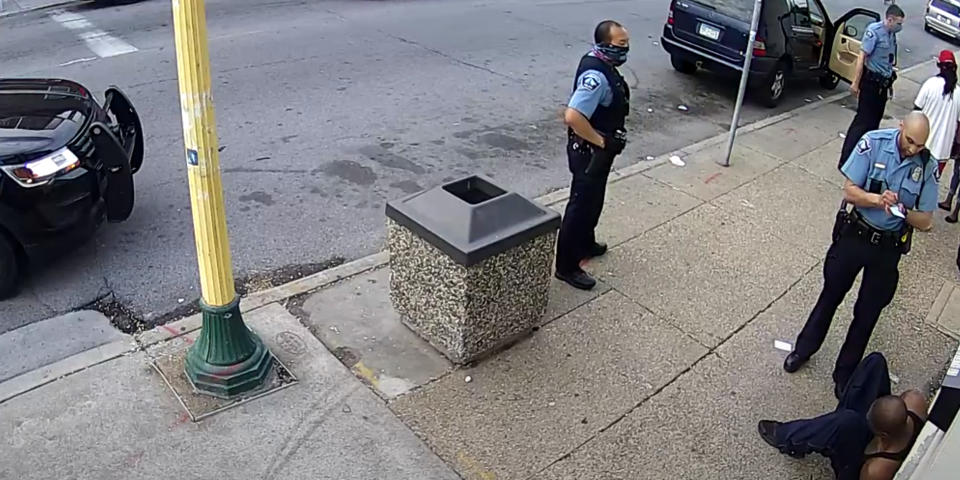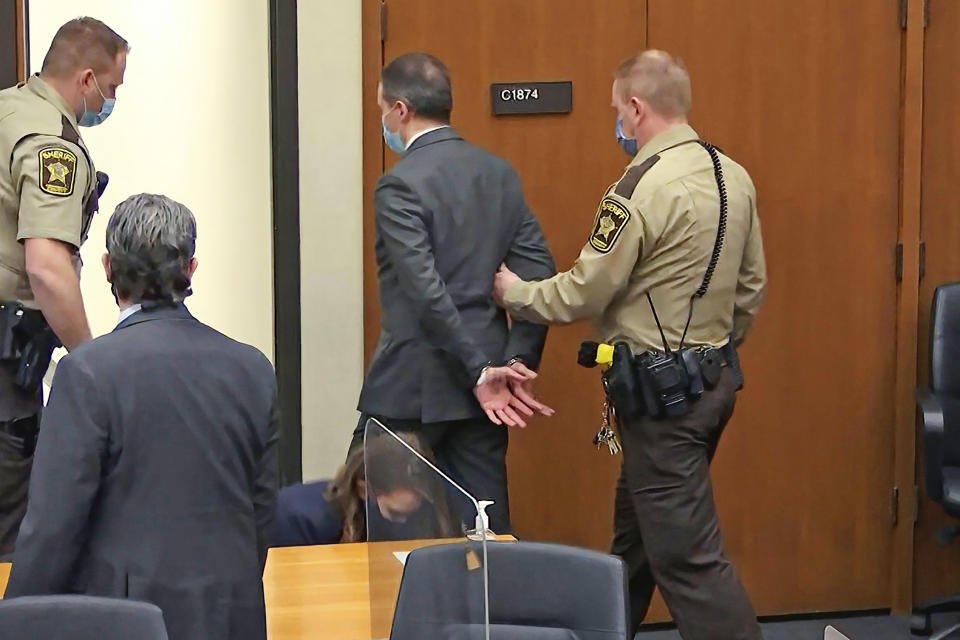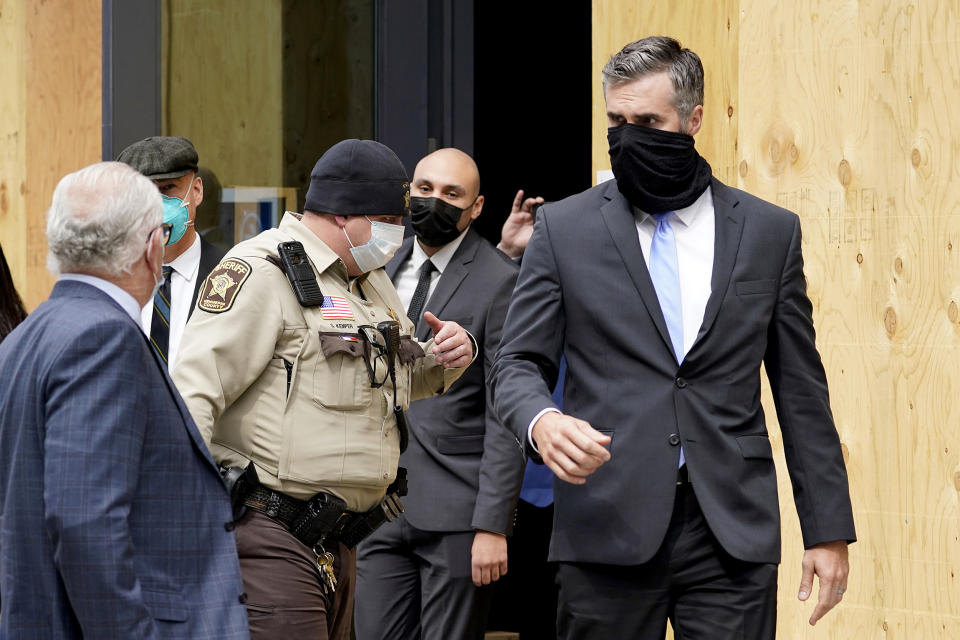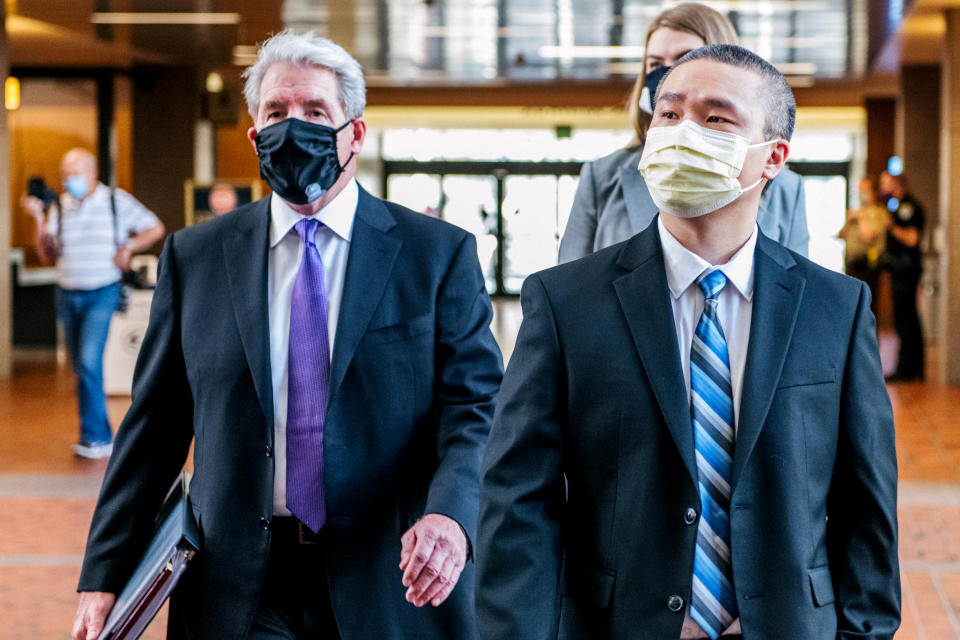What Chauvin's conviction means for other former officers charged in Floyd's killing
- Oops!Something went wrong.Please try again later.
Derek Chauvin's conviction on all counts of murder and manslaughter in the death of George Floyd is a major blow for the three other officers awaiting trial this summer in connection with the arrest, defense lawyers and legal experts said.
Former Minneapolis police officers J. Alexander Kueng, Thomas Lane and Tou Thao are charged with aiding and abetting second-degree murder and manslaughter. They are expected to be tried together in August and could face maximum sentences of 40 years in prison.
Floyd, a Black man, died May 25 after Chauvin, a white 19-year veteran of the Minneapolis Police Department, pressed his knee into his neck for more than nine minutes. All four officers were fired May 26 after a video showing Floyd's arrest went viral.
On Tuesday, Chauvin was convicted of second- and third-degree murder, as well as second-degree manslaughter. The verdict could send him to prison for the rest of his life.
"It shows the strength of the prosecution's case against a jury of his peers beyond a reasonable doubt. All in all, it's bad news for the other co-defendants," said NBC News legal analyst Danny Cevallos, a criminal defense lawyer.

Attorneys for Kueng and Thao declined to comment. An attorney for Lane did not immediately respond to a request for comment.
Lawyers and legal experts said that Chauvin's conviction helps prosecutors but that they will still face a battle in court.
"On the one hand, it's definitely empowering for the prosecution, and on the other it's pressure," criminal defense lawyer Nicole Hochglaube said.
She said the trial would be complicated because the three officers played different roles from Chauvin's and had different levels of experience.
"The prosecution's work is certainly not over," she said.

Kueng and Lane are accused of helping Chauvin restrain Floyd on the ground. Lane also drew his gun on Floyd after he first approached Floyd's car and began speaking with him. Thao watched bystanders who had gathered.
Cevallos said the officers may have "a more defensible case because they didn't put the knee on the back of the neck," as Chauvin did. "But, in a sense, they have a harder case, because the prosecution really just needs to link them into helping their brother officer at the time," he said.
Jurors in the Chauvin trial saw extensive video from bystanders, police body camera video and security video.
Cevallos said the videos could play a major role in the case of the other officers.
"There's no question there's so much video that likely shows the conduct of the other officers that we may not have noticed when Derek Chauvin was in the defendancy," he said.
Dan Herbert, a defense lawyer who has represented hundreds of police officers, said that while the case against the other officers is separate from Chauvin's, his conviction "absolutely does not bode well for these defendants." Herbert represented Jason Van Dyke, a white Chicago police officer who was convicted in the 2014 shooting death of Laquan McDonald, a Black teenager.

He said the case would be especially difficult for the defense if the trial is also in Hennepin County.
"I think that they probably are recognizing that if they take a jury that's within this county, as well, that their fate may be doomed," he said.
Herbert said that in light of the Chauvin verdict, the evidence and the public reaction, prosecutors are likely to press for a jury trial rather than negotiations or bargaining with the co-defendants.
But if you're a co-defendant, "you might want to be considering if there's a way to opt for a bench trial versus going through the jury trial route that has happened here," he said.
Herbert said the defense would most likely file a motion to move the trial because of juror bias, a motion that was denied in Chauvin's trial.
"To me, it's the critical issue, and it determines guilt or innocence," he said.
Hochglaube said the judge could rule to move the trial because things "evolved so dramatically" throughout Chauvin's trial.
She said potential jurors could have been exposed to additional information, including the fatal police shooting of Daunte Wright about 10 miles from where Floyd died. They also could have seen or learned of protests in Minneapolis after that killing and the Chauvin verdict.
"I think that the factors that would lead a judge to at least consider a change of venue have evolved and may be more relevant to these officers than they were to Chauvin," Hochglaube said.

Hochglaube said another potentially important development is the Justice Department's announcement Wednesday that it is launching a civil rights investigation of the Minneapolis Police Department. The investigation will examine whether the department engages in a pattern or practice of policing that violates the Constitution or federal civil rights laws.
Attorney General Merrick Garland said Justice Department lawyers will look at whether Minneapolis police use excessive force, including during protests, or engage in discriminatory conduct. They will also examine whether police treatment of people with behavioral health problems follows the law.
Hochglaube said that the move was "pretty meaningful" and that it "could really change things for how the trial might move forward for the next three officers."
She said two of the officers, Lane and Kueng, were rookies with just days of experience as full-time officers when Floyd was arrested.
"If I were the lawyer for any of those individuals, I would certainly want to know what the department investigation revealed," she said. "Were they just simply following instructions and trained poorly?"
She said she could also imagine attorneys' asking for more time for the investigation to produce its findings.
"One thing that could make these officers sound potentially more innocent to a jury is that they were trained poorly or improperly in the use of force by their department or their department encouraged improper use of force," she said.
Attorneys for the three officers have filed motions to dismiss the charges, partly over allegations of prosecutorial misconduct.
Kueng and Lane were responding to a report that a counterfeit $20 bill had been used at a Cup Foods in Minneapolis on May 25 when they encountered Floyd. Chauvin and Thao arrived shortly afterward.


